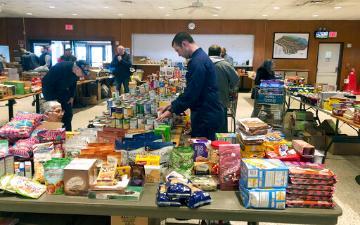
Susan Haigh/AP Photo
Anita Varma, PhD (@anitawrites) is the assistant director of Journalism & Media Ethics at the Markkula Center for Applied Ethics at Santa Clara University where she leads the Solidarity Journalism Initiative. She is also a visiting lecturer in journalism ethics at UC Berkeley’s School of Journalism. Views are her own.
Veterans Day often brings increased media attention to issues that affect veterans and military families. Hunger, for example, affects thousands of military families in the United States, and persists in the pandemic. Yet when it isn’t a holiday, coverage of issues that affect vulnerable people is regularly buried beneath scandals involving politicians, celebrities, and crime. It’s time to change that.
In recent years, ethical news distribution and amplification discussions have largely focused on what not to distribute and what not to amplify. It is encouraging to see that some news outlets across the country have begun to halt the amplification of false claims – even when these claims come from the highest offices in this country. We need a similarly concerted commitment to shaping digital media that stands with vulnerable people and leaves no one behind. This work begins with keeping issues of basic dignity in the news with as much fervor and commitment as rebutting and limiting politicians’ false claims.
Take Pennsylvania, for example. Whether you’re in Pennsylvania or not, during the November election frenzy you likely heard quite a bit about the state and its counties due to their 20 electoral votes that ultimately tipped the scales for Joe Biden to become the next president. In the weeks leading up to the election, you may also remember scrolling social media feeds with news about Pennsylvania voters, fracking, and the racial composition of the state.
It’s less likely, though, that you saw much mention of rising hunger in Pennsylvania.
Hunger during the covid-19 pandemic has become a crisis unto itself, as people who were already on the precipice of not earning enough for basic needs have been plunged into food instability due to layoffs and lack of federal relief. Pennsylvania is just one example of a state where food banks are anxiously trying to keep up with growing demand, which is far from a sustainable or desirable long-term solution.
At the same time, it would be unfair to suggest that journalists do not cover hunger at all. Local, national, and international journalists have reported on hunger throughout the year – yet these stories are less frequent and far less visible through tech platforms’ news tabs compared to the latest lie, firing, or lawsuit in Washington, DC.
Ethical news distribution would keep issues of hunger, shelter, and safety in the news – and at the top of our news feeds – as matters of unequivocal public importance. What could be more newsworthy than growing numbers of people struggling to survive?
Over the past four years, journalists, researchers, and thought leaders have demonstrated their commitment to protect democratic institutions by pushing against normalizing disinformation and misinformation. Now, let’s meet the moment of intense and growing inequality across the country by drawing attention to people whose shared struggles to survive remain deeply newsworthy. Our democratic ideals are still at stake.
The Journalism & Media Ethics program at the Markkula Center for Applied Ethics is leading a collaborative effort to offer practical guidance on covering ongoing issues effectively and ethically, and developing justifications for news distribution platforms to prioritize these exigent issues in news feeds. If you or your organization would like to join or support this effort, please contact avarma2@scu.edu.
